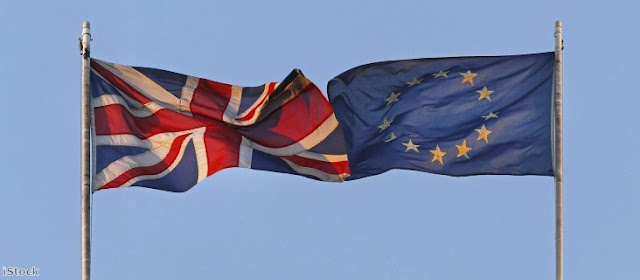The EU Referendum: Thinking Catholic
I've been wrestling over the EU referendum like everyone else in Britain over the past few weeks. I am undecided as to how I will vote, I chose to listen carefully to the arguments from both sides of the debate before I made up my mind which way to cast my vote. I have to say I have been disappointed that many people had already made up their minds long before the debate started and many have harranged and shouted from their respective side of the argument all through the recent weeks.
I think there are strong arguments for both scenarios. I do not agree that it is an easy decision to make. Ideologically, the question is boiling down to who I want to be with...I do want to be with Europe, I have grown up in a generation and peer group who consider themselves largely European. Well traveled and knowledgable about all that is wonderful in Europe, I feel comfortable in Rome, Berlin, or Paris. But do I want to be ruled by Europe and subject to European diktat?
Ultimately, I want to be with the positive, open, progressive side of the debate, not the closed, fearful, backwards side of the debate. I am for people, for society, for co-operation and collaboration. Frustratingly, you could argue that either side represent that ambition and certainly from a Catholic perspective, it is no simpler choice.
Stephen Wolfe, MEP has written this excellent letter to Cardinal Nichols stating the case for Brexit and basing his argument in Catholic social teaching. Similarly, at a recent Catholic Voices event, Tim Stanley gave a Catholic case for Brexit thus:
Dr Rupert Beale has been an ardent campaigner for the remain side of the debate and has certainly shared some convincing material with me, such as this argument from Richard Rex of King's College Cambridge and this talk from Professor Michael Dougan who analyses the EU referendum debate here:
Dr. Beale has written this guest blog to elucidate the Catholic case for Remain and asked me to post it here:
Our earthly rulers falter, our people drift and die;
The walls of gold entomb us, the swords of scorn divide.
I had intended this to be a riposte to the various arguments with a Catholic flavour in favour of the UK leaving the EU, but the words of G.K. Chesterton’s hymn have been swirling round my brain of late. I fear that what I might have written would have been scornful. There’s been quite enough of that.
What I ask of all people of good conscience who believe that the EU is not a good thing is this: please do not vote for us to leave.
Many people were upset by the death of Jo Cox despite never having met her. I cannot imagine the shock and anguish that her husband must be feeling. Somehow he found the strength to issue a very dignified and fitting tribute to his wife. One poignant sentence stands out for me: “She would have wanted two things above all else to happen now, one that our precious children are bathed in love and two, that we all unite to fight against the hatred that killed her.”
It is love for one another that defines us as Christians. A love that imitates Christ’s universal and self-sacrificial love. That is why we defend all human lives, and why we do not try to make different categories of worth between persons – all are infinitely loved by an infinite God. Value to us is the dignity and flourishing of persons; it is not a number of pounds in a bank, even if it’s the Bank of England. People to us are equal: born or unborn, young and vigorous or old and dying. They are not different in value for being British or French, Romanian or Bangladeshi.
We can have a debate about the European Union. It’s a human political institution, with all the usual faults. I have argued that Britain benefits from membership (it certainly does in narrow monetary terms). I have also argued that British political influence has been a good thing in the EU as regards an area that’s personally important to me: scientific research. This scientific excellence fostered by the EU promotes economic growth, as well as the health and wellbeing of Britons, Europeans and all humanity. These, we should agree, are good things. Furthermore, it’s very hard to see how the UK could get a better deal outside the EU.
The EU is not an unalloyed ode to joy. There is a point of view that the loss of sovereignty entailed by (for example) allowing an international court primacy over a British court is intolerable. Some believe that the EU is remote and less accountable than it should be. The original noble ideals of the predecessor to the EU – which were couched in rather specifically Christian terms – have to some extent been betrayed.
Personally, I do not see that voluntary submission to the judgements of international courts (not confined to the EU of course) is a regrettable loss of sovereignty, but I think you can have a reasonable debate about it. There is also a very uncomfortable argument that it is in fact Britain that's bad for the EU (our influence is by no means always for the best).
The EU is a collection of 28 separate nation states, one of which is our own decidedly imperfect one. I agree that the EU has done and continues to do things which go against the high ideals of its founders – but imperfection is to be expected, whatever mechanisms are in place to help smooth relationships between our different countries.
Whatever you think about the EU, it cannot be emphasised enough that the merits or otherwise of the EU are not on the ballot paper. What’s on the ballot paper is leaving the EU. The wider context of this vote is not the impassioned but usually polite discourse between committed Christians. The context is fear of immigrants, lies about money, distrust of foreigners, distrust of economists, distrust of politicians, distrust of journalists, distrust of ‘experts’ – distrust of everybody.
The context is also a national political debate in which we have the love of money played off against the fear of immigrants. Across continental Europe, the context is many national parties that wish their particular country to break off from the EU (and most of those parties make our own Far Right seem pretty tame).
The context is also the recent horrible killing of an MP doing her job. The suspect has given his name in court as “death to traitors, freedom for Britain”. Inevitably, the motives and state of mind of the suspect have been subject to speculation, and that speculation has varied depending on the particular views of the speculator.
It’s illustrative of the poverty of the national debate that this terrible tragedy is being used to score points. It’s Jo Cox’s husband’s words that we should take to heart, and not give way to hatred. That means no hatred of foreigners, and it means no hatred of politicians either – even if they are guilty of rabble-rousing and xenophobia (as some most assuredly are).
The secular debate around the EU referendum has been conducted in terms which are too often bound by entombing walls of gold and the love of money. They are also being conducted in a way that suggests people – some people at any rate – can be cast adrift.
From all that terror teaches, from lies of tongue and pen,
From all the easy speeches that comfort cruel men;
From sale and profanation of honour and the sword;
From sleep and from damnation, deliver us, good Lord!
In a sea of lies and half-truths there is one particular depth of mendacity that I wish to plunge into: the claim that £350m a week can be spent on the NHS if we leave. It is worse than a deliberate lie. It is specially designed to be a lie, because the Leave camp’s spin-doctors have realised that if they lie about it, it will be talked about a lot.
The counter-argument is that the real figure is lower: £136m. This is great for the Leave camp: it still sounds like a large number, and cements the broader untruth that the EU costs us money in the minds of voters. The demographic they are especially targeting – older Labour voters – is tickled by the promise to spend all that money on the NHS. They have told us a small lie to make us believe a bigger one – what clever fellows those spin-doctors are!
Mendacity is not the special vice of the Leave campaign. It has long ago infected our whole political discourse. If all truth is relative, a lie can surely be a legitimate tool used in pursuit of a political goal. In those circumstances, where to tell a lie is neither considered wicked nor shameful – and is in fact admired for its ability to shift public opinion – it is little wonder that people have lost trust.
Truth and truth-telling are essential to Christian values. Of course, there is nowadays little or no reference to Christianity in public life. But truth-telling is important to secular humanists and people of other faiths too. Can we not replace Christian values with ‘Enlightenment’ values? I don’t see much evidence of that happening.
The secular debate – even if conducted in terms that don’t abandon the concept of truth altogether – is dominated by narrow self-interest. Will Britain be better off? Will I be better off? Will we be able to keep the foreigners out? It’s not exactly the universal brotherhood of man. The Enlightenment owes far more of a debt to Christianity than is generally admitted. The philosopher that atheists don’t much like to talk about is Nietzsche. Right now, it’s his abyss that’s staring into us.
I could see myself voting for Brexit under certain circumstances. For example, if it became a condition of our continued membership that we join the Euro (this would by law be subject to a referendum). The procedure there would be for an elected government to carefully build global alliances and put us in a position to negotiate an orderly withdrawal (we have no such alliance in place, and all our trading partners, allies and EU neighbours are against us leaving). We would need to ensure that any exit did not produce a severe economic shock.
At present, we have no credible scenario to achieve a successful negotiated settlement, and a substantial economic shock is certain if we leave. (I accept that some economists believe we could recover in a decade or so, while others don’t – but that there will be an initial shock is agreed by all.) A severe economic shock to Britain and to the EU at this time would give rise to the perfect conditions for bigotry and hatred to flourish. This we must not allow.
If you, like me, believe on balance that Britain is good for the EU and the EU is good for Britain I expect you will vote to remain. If we do vote to leave, we give succour to the very worst elements of our national politics and the national politics of the other EU members, and we must endure the national humiliation that will follow as best we can.
Take not thy thunder from us, but take away our pride.




Comments
Post a Comment